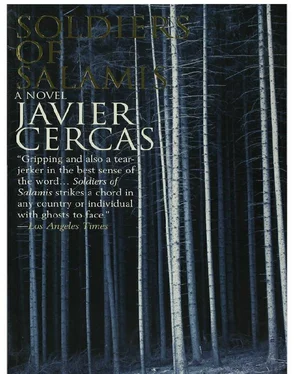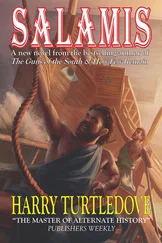Miralles swore that someone like Sánchez Mazas couldn't have gone unnoticed in a place like that, so just like all the rest of his comrades, he'd seen him many times, when he went out to walk in the garden with the other prisoners; he still vaguely remembered his thick glasses, his prominent nose, the sheepskin jacket in which, a few days later, he'd triumphantly relate his incredible adventure for Franco's cameras. . Miralles fell quiet, as if the effort of remembering had left him momentarily exhausted. A faint sound of cutlery came from inside the building; in a fleeting glance I saw the television had been turned off. Miralles and I were alone in the garden now.
'And then?'
Miralles stopped digging with his stick and inhaled the clear midday air.
'Then nothing.' He exhaled slowly. 'The truth is I can't really remember, it was all so confused. I remember we heard shots and started running. Then someone shouted that the prisoners were trying to escape, so we started searching the woods to find them. I don't know how long the chase lasted, but once in a while you'd hear a shot, and they'd caught one of them. Anyway, I wouldn't be surprised if more than one escaped.'
'Two escaped.'
'Like I said, it doesn't surprise me. It had started to rain and the forest was pretty dense. Or at least that's how I remember it. Anyway, when we got tired of looking (or when someone gave the order) we went back to the Sanctuary, got the rest of our things together and that same morning we left.'
'In other words, according to you, there was no firing squad.'
'Don't put words in my mouth, young man. I'm just telling you how things were, or at least how I experienced them. The interpretation is your job, that's why you're a journalist, isn't it? Besides, you have to admit, if anybody deserved to be shot back then, Sánchez Mazas did; if they'd gotten rid of him in time, we might have been spared the war, don't you think?'
'I don't think anyone deserves to be shot.'
Miralles turned unhurriedly and looked at me steadily with his unmatched eyes, as if looking in mine for an answer to his ironic bewilderment; then an affectionate smile, that for a moment I feared would lead to a roar of laughter, softened the sudden toughness of his features.
'Don't tell me you're a pacifist!' he said, and put a hand on my collar bone. 'You might have told me that from the start! And while we're at it,' leaning on me, he stood up and pointed with his stick towards the home, 'let's see how you manage with Sister Françoise.'
I ignored Miralles' taunt and because I thought my time was running out, hastily asked:
'I'd like to ask you one last question.'
'Just one?' He spoke up to address the nun: 'Sister, the journalist wants to ask me one last question.'
'That's fine with me,' said Sister Françoise. 'But if the answer goes on too long, you're going to miss your lunch, Miralles.' Smiling at me, she added: 'Why don't you come back this afternoon?'
'Yes, young man,' Miralles agreed jovially. 'Come back this afternoon and we'll go on talking.'
We decided I'd come back about five, after his siesta and rehabilitation exercises. Along with Sister Françoise I accompanied Miralles to the dining room. 'Don't forget the tobacco,' Miralles whispered in my ear, in farewell. Then he went into the dining room, and as he sat down at a table between two white-haired old ladies who'd already started to eat, ostentatiously shot me a conspiratorial wink.
'What did you give him?' asked Sister Françoise as we walked towards the exit.
Since I thought she was referring to the pack of forbidden cigarettes that bulged in Miralles' shirt pocket, I blushed.
'Give him?'
'He seems very happy.'
'Ah,' I smiled with relief. 'We were talking about the war.'
'What war?'
'The war in Spain.'
'I didn't know Miralles had fought in that war.'
I was about to tell her that Miralles hadn't fought in one war, but many, but I couldn't, because I suddenly saw Miralles walking across the Libyan desert towards the Murzuk oasis — young, ragged, dusty and anonymous, carrying the tricolour flag of a country not his own, of a country that is all countries and also the country of liberty and which only exists because he and four Moors and a black guy are raising that flag as they keep walking onwards, onwards, ever onwards.
'Does anyone come to see him?' I asked Sister Françoise.
'No. At first his son-in-law used to come, his daughter's widower. But then he stopped coming; I think they fell out. Miralles can be a slightly prickly character after all — I can tell you one thing though: he has a heart of gold.'
Listening to her talk about the embolism that paralysed Miralles' whole left side a few months ago, I thought how Sister Françoise spoke like the director of an orphanage trying to place an unruly pupil with a potential client; I also thought how Miralles was perhaps not an unruly pupil, but he certainly was an orphan, and then I wondered whose memory he'd cling to when he was dead so as not to die completely.
'We thought that was the end,' Sister Françoise went on. 'But he's recovered very well; he's got the constitution of an ox. He hasn't taken well to giving up smoking or eating without salt, but he'll get used to it.' When we got to the desk, she smiled and held out her hand. 'Well then, we'll see you this afternoon, won't we?'
Before leaving the residential home I looked at my watch: it had just gone twelve. I had five empty hours before me. I walked awhile along the route des Daix looking for a bar with a terrace where I could get something to drink, but, since I didn't find one anywhere — the neighbourhood was a network of wide suburban avenues with little semi-detached houses — as soon as I saw a taxi I stopped it and asked him to take me to the city centre. He dropped me off in a semi-circular plaza that opened onto the Palace of the Dukes of Burgundy. In front of its façade, sitting at a table on a terrace, I drank two glasses of beer. From where I was sitting I could see a sign with the name of the plaza: Place de la Liberation. Inevitably I thought of Miralles entering Paris through the Porte-de-Gentilly the night of 24 August 1944, with the first Allied troops, on board his tank which would have been called Guadalajara or Zaragoza or Belchite. Beside me, on the terrace, a very young couple were marvelling at the laughter and expressions of their pink baby, while busy, indifferent people walked by. I thought: Not a single one of these people knows of the existence of that practically one-eyed, dying old man who smokes cigarettes on the sly and at this very minute is eating without salt a few kilometres from here, but there's not a single one of them who's not indebted to him. I thought: No one will remember him when he's dead. I saw Miralles again, walking with the flag of the Free French across the infinite, burning sands of Libya, walking towards the Murzuk oasis while people were walking across this French plaza and across all the plazas in Europe going about their business, not knowing that their fate and the fate of the civilization they'd abdicated responsibility for depended on Miralles continuing to walk onwards, ever onwards. Then I remembered Sánchez Mazas and José Antonio and it occurred to me that perhaps they weren't so wrong and that at the eleventh hour it always has been a squad of soldiers that has saved civilization. I thought: What José Antonio and Sánchez Mazas could never imagine was that neither they nor anyone like them could ever form part of that eleventh-hour squad; on the contrary it would be formed by four Moors, a black guy, and a Catalan lathe operator who happened to be there by chance or bad luck, and who would have died laughing if anyone had told him he was saving us all in that time of darkness, and perhaps precisely for that reason — because he didn't imagine civilization at that moment depended on him — he was saving it and saving us, not knowing his final reward would be an unknown room in a residential home for the poor, in a sad city of a country that wasn't even his country, and where no one except maybe a smiling skinny nun, who didn't know he'd fought in the war, would miss him.
Читать дальше












